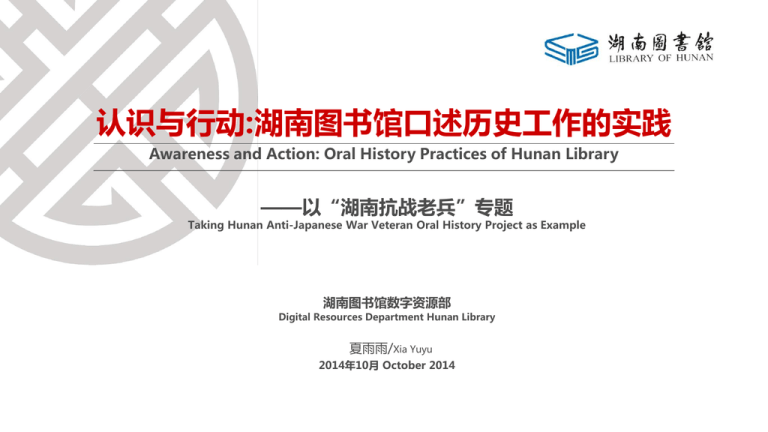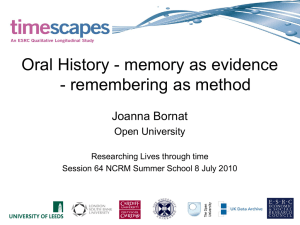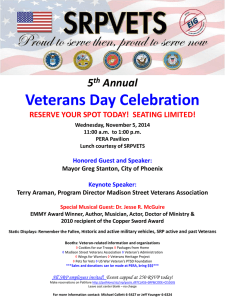
认识与行动:湖南图书馆口述历史工作的实践
Awareness and Action: Oral History Practices of Hunan Library
——以“湖南抗战老兵”专题
Taking Hunan Anti-Japanese War Veteran Oral History Project as Example
湖南图书馆数字资源部
Digital Resources Department Hunan Library
夏雨雨/Xia Yuyu
2014年10月 October 2014
湖南图书馆自2008年开始,
陆续进行了湖南地方口述历史的专题性挖掘,形成了
“寻找城市记忆”、“湖南地下党人”、
“湖南抗战老兵”、“湖南民间达人”、
“南下干部”、“湖南地方戏剧人物”
等多个专题,综合了图、文、音频和视频资料,
通过图片、文字、声音、影像等形式来记录和保存,
目前该项工作正在深入推进中。
Since 2008, the Hunan Library has conducted a local oral history's thematic excavation,
forming many topics like
"Looking for City Memory", "Hunan underground people",
"Hunan Anti-Japanese war veterans",
"Hunan Folk Intelligent People", "
Cadres Who Went South ", " Hunan Local Theater People”
and so on. It combined pictorial, literal,
audio and video materials,
recorded and stored by pictures, literalness, sound, video and other forms.
That work is further continuing
<寻找城市记忆>
<Look for city memory>
以“纪念长沙文夕大火七十周年”为主题
Make it a theme:“Commemorate the Seventieth Anniversary Of Wenxi Fire in Changsha "
<湖南地下党人>
<Hunan underground peope>
<湖南抗战老兵>
<Hunan Anti-Japanese war veterans>
<湖南各界达人>
<Hunan intelligent people in all walks of life>
《一》
湖南抗战老兵口述历史的史料价值与现实意义
The Historical Value and Practical Significance of Hunan Anti-Japanese War
Veterans' Oral History
www.txhn.net
选定以“寻访湖南抗战老兵”为主题
"Look for Hunan Anti-Japanese war veterans" was selected to be the theme
抗日战争时期,湖南是重要的战略要地,中日双方在湖南长沙、常德、衡阳、湘西先后展开了六次较大规模的正
面战。
During the Anti-Japanese War, Hunan was an important strategic location, the two sides of China and Japan having
launched six large-scale pitched battle in Changsha, Changde, Hengyang and Xiangxi in Hunan Province.
抗战老兵们是抗日战争的亲历者、历史的当事人。
Anti-Japanese war veterans are the witnesses of War, the parties of history.
年事已高,大多已八九十岁,且余生不多。由于年龄和身体原因,老兵们还正在迅速而悄然凋零。
They are advanced in age, most of whom are 80 or 90 years old, and few are still living. Due to their age and health reasons,
these veterans are quietly but rapidly dying.
聚焦普通士兵和下层军官,文化程度各异,却都默默无闻、鲜为人知。
The Focus was on the ordinary soldiers and the lower officers, varying in educational level, but all unknown to the public
and rarely known by people.
“滴水见太阳”的史料价值
Historical value
湖南抗日老兵口述历史工作,至今采访了一百四十余名抗战老兵,其涵盖了步兵、炮兵、工兵、通讯兵、伞兵、
骑兵、运输兵、后勤医护兵等诸多兵种,经历了抗日战争中大部分有影响的事件和战役,如蒋介石征兵动员、焦
土抗日、长沙文夕大火、远征缅甸印度、四次长沙会战、常德会战、衡阳保卫战、湘西会战、湘鄂会战、日军投
降等。
In the work of Hunan anti-Japanese veterans’ oral history, we have interviewed more than 140 anti-Japanese veterans.
Included in the interviews were infantry, artillery, sapper, dog catcher, paratrooper, cavalry, transportation soldier, medic and
many other branches of the military. They experienced most the influential events and battles, such as Chiang Kai-shek’s
mobilization of conscription, scorched earth anti-Japanese, Wenxi fire in Changsha, the expedition to Myanmar and India,
the four Battles of Changsha, the Battle of Changde, the Hengyang Defense, the Battle of West Hunan, the Battle of Hunan
and Hubei, the surrender of Japan and so on.
“滴水见太阳”的史料价值
Historical value
湖南抗战老兵口述历史,以科学理性的态度,聚焦中下层军官和普通士兵,基于亲历者的口述史料全方面、多维度
地反映了抗日战争时期湖南的社会政治、经济、文化、民生、战争的全貌。其还原了相对真实的历史原貌,填补了
湖南抗战史料的部分空白,丰富了湖南抗日史料的部分内容,具备“补史”、“证史”的功能,为社会提供了一种
全新
的观照历史、反思历史的观点和角度。
The oral history of Hunan anti-Japanese veterans focused on the lower officers and the ordinary soldiers with a scientific and
rational perspective. Based on the witness's oral historical data, it reflects in multiple dimensions the whole picture of Hunan's
society, policy, economy, culture, the people's livelihood and the war during the Anti-Japanese War, in all aspects. It restored
the original appearance of the real history, filling in some part of the historic material's blanks regarding the Hunan AntiJapanese War, enriched part of the historic material of the AntiJapanese War, using functions of “make up the history” and
“prove the history”, which provides new ideas and perspectives to view and reflect the history.
“抢救历史、传承精神”的现实意义
The Practical Significance of “History Salvage, Spirit &Heritage”
收集、整理、保存和传承湖湘文化与本土记忆,是湖南图书馆的职责所在,也是丰富图书馆馆藏的需要。
It is the responsibility of the Hunan Library to collect, organize, preserve and inherit Hunan culture and local history, through
which the need to enrich the library's collections is fulfilled.
尊重、铭记历史,纪念和缅怀在抗战中为国捐躯的先烈。
The practical significance is to respect and remember history, and to commemorate and remember the martyrs who
sacrificed their lives in the war for the country.
呼吁社会和国家给予抗战老兵们在物质与精神上应有的尊重和关爱。
It is also to call on the community and the state to give the anti-Japanese war veterans the respect and caring they deserved
in both material and spirit.
抢救历史,其意义超越历史。烽火已然远去,精神需要传承。
The significance of history salvage is beyond history. Flames of war have already been extinguished, but the spirits need to
be inherited.
《二》
湖南抗战老兵口述历史工作的实践方法及流程
Practical Methods and Process of Work In Hunan Anti-Japanese War Veterans
Oral History????
www.txhn.net
前期准备工作
The Preparatory Work
1、前期资料收集Preliminary data collection
(1)搜集与整理口述人名单(以表格的形式,包含以下信息)
姓名、性别、出生年月、抗日战争中的基本情况、现居地址、联系方式。
Collect and collate the list of narrators (In tabular form, with the following information): Name, sex, date of birth, the basic
situation in Anti-Japanese War, current living address, contact information
(2)收集与查阅与口述人经历相关的背景史料
Collect and consult historical background data related to the narrators
2、按地区确定寻访名单及安排采访时间
Determine the visiting list and arrange an interview time by region
3、采访小组开碰头会,讨论并拟定采访提纲,强调其注意事项。
Interview teams have a brief meeting to discuss and develop an interview outline, emphasizing the matters that need attention.
4、明确采访小组各成员的职责分工。成员一般为3-4名,有条件安排4人为一组为佳。
Make the assignments of responsibilities clear to each member of the interview team. There are generally three to four
members on a team, with four being ideal, if conditions permit.
前期准备工作
寻访小组一般为3-4人,有条件安排4人为一组为佳。
The Preparatory Work
4人一组 Group of 4
成员Members
A
前期准备中
分工
Division of
work
In
preparation
采访过程中
During the
interview
寻访名单确定、背景史料收集
Determine the Interview List, collect
background historical data
组长、拍照、辅助采访、全局统筹
Team Leader, take pictures, assist
interviewee, co-ordinate overall
situation
B
C
D
寻访名单确定、背景史料收集
寻访行程路线的安排
联络口述者
Determine the Interview List, collect
background historical data
主采访、录音Main interviewee
record
Arrange
Contact
Interview itinerary
the interviewee
主机位摄像Main Camera
shooting
3人一组Group of 3
成员Members
前期准备中
分工
Division of
work
In
preparation
采访过程中
During the
interview
A
B
C
寻访名单确定、背景史料收集
寻访行程路线的安排Arrange
联络口述者
Determine the Interview List, collect
background historical data
Interview
Contact
itinerary
the interviewee
组长、主采访、录音
Team Leader Main interviewee record
主机位摄像、辅助采访
Main Camera shooting
assist interviewee
辅助机位摄像、拍照、统筹
Auxiliary Camera
Shooting,
take pictures co- co-ordinate overall
situation
辅助机位摄像
Auxiliary
Camera
shooting
采访工作
Interview Work
采访是口述历史工作中最为关键的一个环节,首先采访活动应在口述人自愿的前提下进行,采访者需向口述人说
明口述历史采访活动的目的和实施流程。
The interview is the most critical aspect of oral history work. Interviews should be conducted according to narrators’
willingness and availability. The interviewer needs to explain the purpose of oral history interviews and the implementation
processes to the narrators.
自愿原则是需要我们口述历史工作者严格遵守的,这是对口述者的尊重,也是采访能顺利进行的保障。
Oral history workers must strictly abide by the principle of voluntary involvement which leads to a respect for the narrator
and is also a guarantee to the smooth process of the interview.
采访工作
Interview Work
1、通过采访,明确地掌握与口述人相关的有效信息与口述资料,这也是寻访提纲的主线脉络。
Through interviews, clearly grasp the valid information and oral materials related to narrators,
which is also the main line of an interview outline.
(1) 口述人的基本信息:
Narrator’s basic information:
姓名、曾用名、性别、出生年月、籍贯、学历、入伍时间、入伍方式、部队番号、现居地。
Name, former name, gender, date of birth, place of birth, educational background, enlistment
date, the method of joining the army, unit designation, current residence
(2) 口述人关于抗日战争亲历的口述资料,其中包括具体的战斗细节,以及在战斗中记忆最深的人、事、物等。
The oral information about the narrator's personal experience in Anti-Japanese War, including specific details of the battle,
as well as the most memorable people, events, things, etc.
采访工作
Interview Work
2、采访工作基本流程/The basic interview process
(1) 请口述人在湖南图书馆“寻访抗日老兵”红旗上签上自己的名字以及采访时间,以做为实物史料进行保存,
并
借此向抗战老兵们致敬。
Invite the narrators to sign on the red flag of Hunan library “Look for the Anti-Japanese War Veterans" with their names
and the interview time, which will be saved as true historical data, and thereby pay tribute to the war veterans.
(2) 请口述人按自己的思路讲述抗战亲历。
Invite the narrators to tell their personal experiences in the Anti-Japanese War using their own words.
(3) 采访者梳理笔录资料后,向口述人确认讲述中出现的时间、地名、人名、事例等信息。再根据其口述要点,
进一步发掘性提问。需要注意的是,一定要尊重对方隐私。若有些话题口述人不愿多提及,不能执意寻根问底。
After recording information, the interviewer should confirm with the narrators the time, the location, names, stories, and
other information which appeared in the narration. Then, further exploratory questions should be asked, based on the main
points of the narration. It is important to note that we must respect the privacy of others. If the narrator does not want to
discuss much about some topic, do not insist on tracking the origins.
采访工作
Interview Work
2、采访工作基本流程/The basic interview process
(4) 采访结束后,请口述人在 “授权书”上为同意授权湖图书馆保存其口述史料签名。这是出于尊重其知识产权
,
需严格遵守实施。
After the interview, ask the narrator to sign the authorization allowing the Library to save their oral historical data. There
should be an agreement to strictly abide by and implement the security of intellectual property.
(5) 口述人与寻访小组合影留念,并且询问记录下口述者常用联系方式和收信详细地址,用于之后回访和照片寄
出(在采访后一周时间内为口述者邮寄送上合影、个人照3-4张作为纪念予以感谢)
The narrator and interview team should pose for pictures. Ask for and record the narrator‘s commonly used contact and
detailed mail address for return visits and posting of photos. (Within a week after the interview, send 3-4 person group or
personal photos to the narrator as a memento expressing gratitude)
(6) 向口述者及家人征集相关图片、文章、实物的史料文献。
Collect historical documents, related pictures, articles and material objects from the narrator and their families.
采访工作
Interview Work
3、口述历史资料采集中的拍摄要求/Shooting requirements in collecting Oral history data
(1) 实地拍摄、现场录制。Field shooting, live recording
(2) 以“寻访湖南抗战老兵”红旗为背景标识,突出寻访主题,增强录像的画面感。
Make the red flag of "Look for Hunan anti-Japanese War Veterans" as background logo, to highlight the theme of “look
for”, to enhance the video's sense of photography.
(3) 口述者与采访者面对面。Interviewee and interviewer face to face
(4) 全程录音,录音笔近距离贴身放置。Totally record, place voice recorder next to the person
(5) 照片类型:口述者正面照、口述者侧面照、采访场景照
,技术标准要求:构图规整、主题明确。
Photo type: narrator's frontal photo narrator's side photo, interview scenic photo , Technical standards: regular
composition, clear theme.
(6) 摄像机的机位布局:一台主机位,一台辅助机位。技术标准要求:焦点清晰、声音清楚、画面稳定。
Camera setup: A main camera,an auxiliary camera。Technical standards: Crisp focus, clear voice,stable image
主机在人物正前方,使用固定镜头,对于口述者与采访者使用中近景来表现。主要拍摄人物正面并且保留全场音频
。
Main camera: set in front of the characters, using a fixed lens; use medium close shot to show the interviewee and interviewer;
primarily shoot people’s full face and keep the whole video.
辅助机位:从多个角度拍摄,便于后期剪接。注重采访花絮的拍摄,给后期视频编辑丰富素材。
Auxiliary camera: Filmed from multiple angles, to facilitate post-splicing; Pay attention to the shooting of the interview
footage, to enrich material for later video editing
后期资源整理
Later stage of resource collating
每一次寻访结束后,必须要完成的资源整理。
Collating must be completed at the end of each interview
(1)以寻访时间为序,建立“湖南抗战老兵口述寻访资料登记表”。
Establishment of a “Registration Form of Hunan Anti-Japanese War Veterans’ Oral Interview Information" - in chronological
order of interview .
(2)每一位口述者都建立一个独立文件夹。将该口述者的数字资源进行汇总,包括录音、照片、视频、史料(老照片
、
纪念物、手稿、生活场景的照片),及时将数字资源上传入藏。
Interview information: Each narrator has a separate folder to aggregate his/her digital resources, including recordings,
photographs, videos, historical data (old photos, memorabilia, manuscripts, life scenes photos); to timely upload the digital
resources for saving
后期资源整理
Later stage of resource collating
每一次寻访结束后,必须要完成的资源整理。
Collating must be completed at the end of each interview
(3)征集回来的实物、文稿、书籍进行整理并做好记录,上交入藏。
Organize and make a record of the material objects, documents and books collected, then turn them over them to save。
(4)整理口述者基本信息与照片,考证口述者主要经历中具体时间、地点、人物及事件,撰写寻访手记,同步至天下
湖南网(www.txhn.net)进行展示。
Organize the narrator’s basic information and photos, textual research specific time, place, people and events in the narrator's
major experience writing interview notes, which will be synchronized to the world Hunan Network (www.txhn.net) for display.
成果常态展示平台
Achievements normal display platform
天下湖南网 World Hunan Network
www.txhn.net
论坛:http://bbs.txhn.net
Forum: http://bbs.txhn.net
微博:@湖南图书馆-天下湖南网
Microblog:@Hunan Library-World Hunan Network
微信:libtxhn
Wechat:libtxhn
QQ群:97938132(湖南图书馆—口述历史)
QQGroup:97938132(Hunan Library-Oral History )
电话:0731-84174124
Phone:0731-84174124
邮件:hnlibrary_txhn@163.com
Email:hnlibrary_txhn@163.com
《三》
湖南抗战老兵口述历史工作的社会反响
The social repercussions of Hunan anti-Japanese war veterans’ oral history work
www.txhn.net
阶段性成果:《湖南抗战老兵口述录》(上、下册)
The phased results: "Hunan Anti-Japanese war veterans oral record" (upper and lower volumes)
87位湖南抗战老兵的口述记录
Oral record 87 Hunan Anti Japanese war veterans
湖南人民出版社 2014年5月出版
Published by Hunan People's Publishing House in May 2014
湖南省政协副主席 刘晓、
Vice Chairman of Hunan Province PCC Liuxiao
中国抗日战争史学会会长 步平为书作序
President of Chinese Anti-Japanese War History Association Buping
Prefaced the book
入选为湖南省第五届“三湘读书月”
社科类特别推荐书目
Selected as the particularly recommended bibliography of Social science in
Hunan Province’s fifth "Sanxiang Reading Month"
《结语》
口述历史工作任重而道远
Oral History work has a long way to go
www.txhn.net
谢谢观赏
Thank You
论坛:http://bbs.txhn.net
电话:0731-84174124
QQ群:97938132(湖南图书馆—口述历史)
微信:libtxhn
微博:@湖南图书馆-天下湖南网
邮箱:hnlibrary_txhn@163.com









